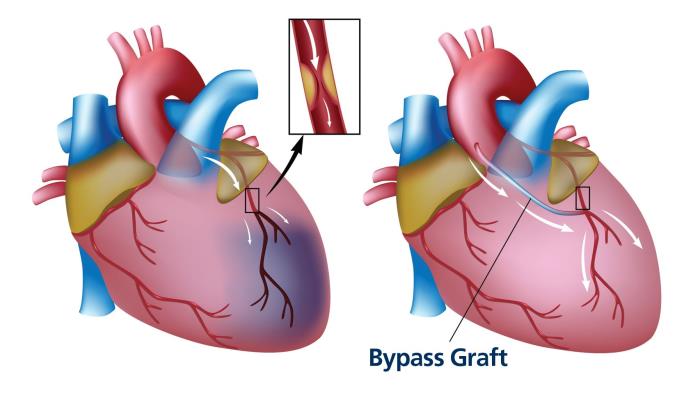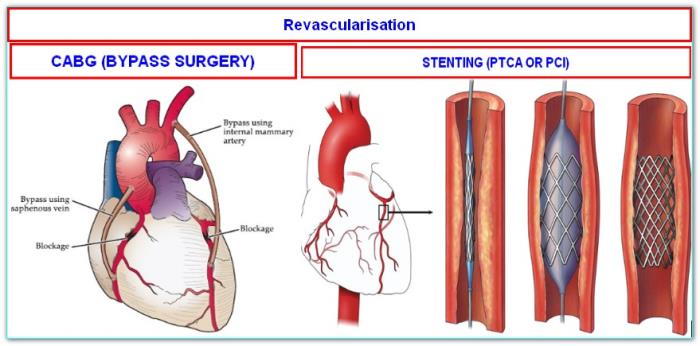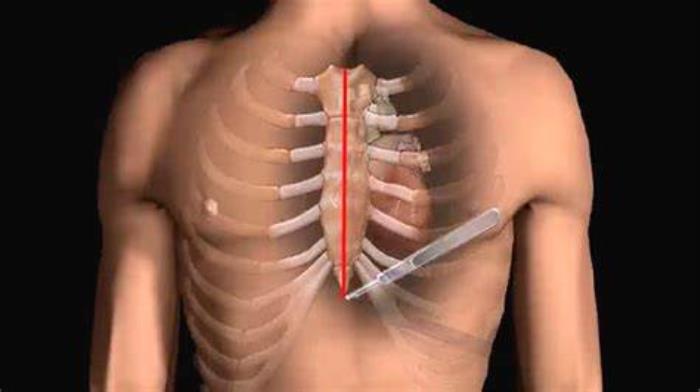Heart bypass surgery, also known as coronary artery bypass grafting (CABG), is a surgical procedure aimed at improving blood flow to the heart. It is commonly performed on patients with significant blockages in the coronary arteries, which can lead to reduced oxygen supply to the heart muscle and an increased risk of heart attack. This procedure not only restores blood flow but also alleviates symptoms associated with coronary artery disease, ultimately enhancing patients' quality of life.
Medical disclaimer: This content is for general awareness and does not replace a doctor’s consultation. For diagnosis or treatment decisions, consult a qualified specialist.
What is Heart Bypass Surgery? A Brief Overview
Heart bypass surgery involves creating a new pathway for blood to flow to the heart by bypassing blocked or narrowed coronary arteries. Surgeons typically use a graft, which can be a blood vessel taken from another part of the body, such as the leg or chest, to create this alternate route. The surgery can be performed using traditional open-heart techniques or minimally invasive methods, depending on the patient's condition and the surgeon's expertise. By restoring blood flow, the surgery aims to prevent further heart damage and improve overall cardiovascular health.
The Mechanism of Action: How Bypass Surgery Works
The primary mechanism of heart bypass surgery is to reroute blood flow around the blocked sections of the coronary arteries. During the procedure, the surgeon identifies the obstructed arteries and attaches one end of the graft to the aorta and the other end to the coronary artery beyond the blockage. This new route allows oxygen-rich blood to reach the heart muscle, reducing the strain on the heart and improving its ability to function effectively. By addressing these blockages, the surgery mitigates the risks associated with inadequate blood supply, such as ischemia and heart failure.

Improving Blood Flow: The Primary Goal of Bypass Surgery
The foremost goal of heart bypass surgery is to enhance blood flow to the heart. By bypassing the blocked arteries, the procedure significantly increases the delivery of oxygen and nutrients to the heart muscle. This improvement in blood circulation not only alleviates symptoms but also plays a critical role in preventing further cardiac events. Enhanced blood flow allows the heart to work more efficiently, supporting the overall function of the cardiovascular system and reducing the risk of complications related to coronary artery disease.
Restoring Oxygen Supply to the Heart Muscle
Bypass surgery is instrumental in restoring the oxygen supply to the heart muscle, which is crucial for its health and functionality. Blockages in the coronary arteries restrict the flow of oxygen-rich blood, leading to conditions like angina, chest pain, and even myocardial infarction (heart attack). By providing an alternative route for blood flow, bypass surgery helps to ensure that the heart muscle receives adequate oxygen, reducing the risk of damage and improving the overall health of the heart.
Reducing Symptoms: Relief from Angina and Chest Pain
One of the most immediate benefits of heart bypass surgery is the significant reduction in symptoms such as angina and chest pain. Many patients suffering from coronary artery disease experience debilitating discomfort due to insufficient blood flow to the heart. By addressing the underlying blockages, bypass surgery can alleviate these symptoms, allowing patients to engage in daily activities with less fear of pain or discomfort. This relief not only enhances physical well-being but also contributes to a more positive mental outlook post-surgery.
Enhancing Quality of Life: Physical and Emotional Benefits
Heart bypass surgery can lead to substantial improvements in both physical and emotional quality of life. Physically, patients often experience increased stamina and the ability to participate in activities they once found challenging due to heart-related symptoms. Emotionally, the relief from pain and anxiety associated with heart disease fosters a greater sense of well-being and optimism. Additionally, successful bypass surgery can reduce the need for ongoing medical interventions, allowing patients to enjoy a more active and fulfilling lifestyle post-recovery.
The Role of Bypass Surgery in Preventing Heart Attacks
Heart bypass surgery, also known as coronary artery bypass grafting (CABG), plays a critical role in preventing heart attacks for patients with severe coronary artery disease. By rerouting blood flow around blocked or narrowed arteries, the surgery restores adequate blood supply to the heart muscle. This procedure alleviates symptoms like chest pain and shortness of breath and reduces the risk of future cardiac events. For many patients, bypass surgery serves as a life-saving intervention that not only enhances quality of life but also significantly decreases the likelihood of heart attacks.
Long-Term Improvements in Heart Function After Surgery
Following heart bypass surgery, many patients experience long-term improvements in heart function. Studies show that the surgery can lead to better exercise tolerance, reduced symptoms of angina, and improved overall heart efficiency. Over time, the heart can adapt to the restored blood flow, leading to enhanced pumping ability and overall cardiovascular health. Many patients report feeling more energetic and capable of engaging in activities they may have previously avoided due to heart-related issues.

Understanding the Types of Bypass Procedures
There are several types of bypass procedures, each designed to address specific needs based on the patient's condition. The most common type is the coronary artery bypass grafting (CABG), where a healthy blood vessel is taken from another part of the body and used to bypass blocked coronary arteries. Other variations include off-pump coronary artery bypass (OPCAB) surgery, which is performed without stopping the heart, and minimally invasive bypass surgery, which uses smaller incisions. Understanding the appropriate procedure for an individual's specific heart condition is crucial for successful outcomes.
The Importance of Postoperative Care for Heart Function
Postoperative care is essential for ensuring optimal heart function after bypass surgery. This includes monitoring vital signs, managing pain, and preventing complications such as infections or blood clots. Patients are often advised to follow specific guidelines regarding physical activity, medication adherence, and dietary changes. Consistent follow-up appointments with healthcare providers allow for the timely identification and management of any emerging issues, helping to support long-term heart health.
Cardiac Rehabilitation: Supporting Recovery and Function
Cardiac rehabilitation is a structured program designed to support recovery and improve heart function after bypass surgery. This multidisciplinary approach typically includes supervised exercise training, education on heart-healthy living, and counseling to address emotional and psychological aspects of recovery. Participation in a cardiac rehab program has been shown to enhance physical fitness, lower the risk of future cardiac events, and improve overall quality of life for patients after surgery.
Managing Risk Factors After Surgery for Optimal Heart Health
Managing risk factors after bypass surgery is crucial for maintaining optimal heart health and preventing future complications. Patients are encouraged to adopt lifestyle changes that include a heart-healthy diet, regular physical activity, and smoking cessation. Additionally, managing conditions such as high blood pressure, diabetes, and high cholesterol through medication and lifestyle changes is essential for protecting the heart. Regular monitoring and collaboration with healthcare providers help ensure that patients stay on track with their health goals.
The Impact of Lifestyle Changes on Post-Surgery Heart Function
Lifestyle changes have a significant impact on post-surgery heart function. Following a heart-healthy diet rich in fruits, vegetables, whole grains, and lean proteins can improve heart health and prevent the progression of heart disease. Engaging in regular physical activity helps strengthen the heart muscle and improves overall cardiovascular function. Additionally, stress management techniques and social support can enhance emotional well-being, which is an important aspect of heart health. Collectively, these lifestyle modifications contribute to better outcomes for patients after bypass surgery.
Monitoring Heart Function: Tests and Assessments
Monitoring heart function after bypass surgery involves various tests and assessments to evaluate how well the heart is performing. Common tests include echocardiograms, which use ultrasound to visualize heart structures and assess function, and stress tests, which measure the heart's response to physical activity. Blood tests may also be conducted to monitor markers of heart health. Regular assessments allow healthcare providers to identify any potential issues early and adjust treatment plans accordingly.

Addressing Potential Complications to Maintain Heart Health
Addressing potential complications is vital for maintaining heart health after bypass surgery. Common complications may include infections, arrhythmias, or graft failure. Patients are educated on recognizing symptoms that require immediate medical attention, such as chest pain, shortness of breath, or signs of infection. Prompt reporting of any unusual symptoms allows healthcare providers to intervene quickly, minimizing the risk of serious complications and supporting a smoother recovery process.
Patient Success Stories: Real-Life Improvements in Heart Function
Patient success stories often serve as inspiring examples of the positive outcomes associated with heart bypass surgery. Many individuals share their experiences of significant improvements in their overall quality of life following the procedure, highlighting enhanced energy levels, increased ability to engage in physical activities, and relief from previously debilitating symptoms. These narratives not only underscore the effectiveness of bypass surgery but also encourage others facing similar heart health challenges to consider surgical options as part of their recovery journey.
The Future of Heart Bypass Surgery: Innovations and Advancements
The future of heart bypass surgery is promising, with ongoing innovations and advancements aimed at improving surgical techniques and patient outcomes. Researchers are exploring minimally invasive approaches, enhanced imaging technologies, and bioengineered materials to improve graft durability and reduce recovery times. Additionally, the integration of artificial intelligence in surgical planning and postoperative monitoring may lead to more personalized and effective care. These advancements hold the potential to further enhance the success and safety of bypass procedures.
Understanding Heart Function Metrics: Ejection Fraction and More
Understanding heart function metrics is crucial for evaluating a patient’s cardiovascular health post-surgery. One key metric is the ejection fraction (EF), which measures the percentage of blood the heart pumps out with each beat. A normal EF indicates good heart function, while a reduced EF may signal potential issues. Other metrics, such as cardiac output and heart rate, also provide valuable insights into heart performance. Monitoring these metrics helps healthcare providers tailor treatment plans to optimize heart health after bypass surgery.
Managing Blood Pressure and Cholesterol Before Heart Bypass Surgery
Understand the importance of managing blood pressure and cholesterol levels prior to heart bypass surgery. This section covers lifestyle modifications and medications that can help stabilize these factors, thereby enhancing surgical outcomes and reducing potential complications.
Importance of Cardiac Rehabilitation for Long-Term Heart Health
Discover the vital role of cardiac rehabilitation after heart bypass surgery. This section discusses how structured rehabilitation programs promote recovery, improve cardiovascular fitness, and foster healthy lifestyle habits, contributing to long-term heart health.
Conclusion: The Transformative Effects of Heart Bypass Surgery
Heart bypass surgery can have transformative effects on a patient’s cardiovascular health and overall quality of life. By effectively improving blood flow, alleviating symptoms, and enhancing heart function, the procedure significantly reduces the risk of future heart attacks. Coupled with proper postoperative care, cardiac rehabilitation, and lifestyle changes, patients can expect long-lasting improvements and a healthier future. The journey towards heart health may be challenging, but the benefits of bypass surgery offer hope and a renewed sense of vitality.
Best Heart Bypass Surgery in India
The Best Heart Bypass Surgery in India is a critical procedure that reroutes blood flow around blocked arteries, improving blood supply to the heart and enhancing patient health and quality of life.
Best Heart Bypass Surgery Hospitals in India
The best heart bypass surgery hospitals in india feature advanced medical facilities and expert cardiology teams, providing comprehensive care from diagnosis to post-surgery recovery for optimal outcomes.
Heart Bypass Surgery Cost in India
The heart bypass surgery cost in india is competitively priced, ensuring patients receive high-quality treatment with transparent pricing and affordable care options.
Best Heart Bypass Surgeons in India
The Best Heart Bypass Surgeons in India are skilled and experienced professionals, committed to delivering personalized care and achieving the best possible surgical outcomes for heart patients.
FAQ
How does heart bypass surgery improve blood flow?
Heart bypass surgery creates new pathways for blood flow by rerouting it around blocked arteries, restoring adequate blood supply to the heart muscle.
What symptoms can be relieved after bypass surgery?
Patients often experience relief from symptoms such as chest pain (angina), shortness of breath, and fatigue following bypass surgery.
How does bypass surgery prevent future heart attacks?
By addressing severe blockages in coronary arteries, bypass surgery reduces the likelihood of heart attacks caused by inadequate blood flow to the heart.
What role does cardiac rehabilitation play in recovery?
Cardiac rehabilitation provides structured support for recovery, including exercise training, education, and counseling, enhancing heart function and overall health.
What lifestyle changes can enhance heart function after surgery?
Adopting a heart-healthy diet, engaging in regular exercise, managing stress, and avoiding smoking can significantly enhance heart function after bypass surgery.
Explore the Best Heart Care Resources in India
Find some of the top cardiologist, surgeons and the best heart hospitals in India
Best Heart Hospitals in India
Choosing the right hospital is crucial for successful heart treatments. If you want to explore trusted options, check the list of Best Heart Hospitals in India offering world-class facilities, advanced cardiac care units, and experienced teams for both simple and complex procedures.
Best Cardiologists in India
Finding the right cardiologist can make a huge difference in early diagnosis and long-term heart health. If you are looking for the Best Cardiologists in India, see this curated list of experts who specialize in preventive care, interventional cardiology, and complex heart disease management. Check the full list Best Cardiologists in India.
Best Cardiac Surgeons in India
If you are planning for heart surgery and need top-level expertise, we recommend exploring the Best Cardiac Surgeons in India. These surgeons have a proven record in performing bypass surgeries, valve replacements, and minimally invasive heart operations with excellent outcomes.
Get more indepth information on Cardiology treatments and their costs.
Conclusion
Your cardiology health deserve the best care. Explore the links above to learn more about the top cardiac hospitals and cardiac surgeons in India.
Do all blockages require bypass surgery? Discover the alternatives, including angioplasty, medications, and lifestyle changes. Learn about the latest advancements, key questions to ask your doctor, and how to decide the best treatment for coronary artery blockages. Click to explore your options! Do All Blockages Require Bypass? Alternatives You Should Know
Can you undergo a second heart bypass? Learn about success rates, preparation, age factors, post-surgery care, and costs in India. Discover how advancements in cardiac care make repeat bypass surgeries safer and more effective. Stay informed for better heart health. Can You Get Another Heart Bypass If Needed Later in Life?
Learn when it’s too late for heart bypass surgery and why timing is critical. Discover risks of delaying, options for late-stage heart disease, and alternatives when surgery isn’t viable. Act early to improve outcomes and protect your heart health. Click to explore expert insights now! When Is It Too Late for Heart Bypass Surgery?